I fish, so I love the valleys. The further you travel upstream and into the mountains, the narrower become the ravines and gullies where trout live. The streams turn to a trickle, leaving a soggy riverbed upstream of flowing water. And somewhere above that is a dry floor of cracked mud, littered with dead leaves and smooth rocks. You can keep going, but before you know it, there’s no stream at all, and you find yourself walking a wooded hollow leading to the top of a mountain.
Hunters need the mountaintops like fishermen need the valleys. I come from a family of avid hunters, and they long for the open wood and dense forest. They need the valleys and the peaks to roam and hunt wild game of all types. But me, I’ve always liked the ditches best — wide or narrow is fine with me.
There’s a place atop a mountain, though, that has my heart as much as any river ever has. It pulls me back time and again, and I revisit the memories there, like turning pages in a scrap book. It’s a small clearing in a Pennsylvania state forest with a stone fire ring, and there’s just enough room among the ferns and maples to hold back the rest of the forest — just enough space to be comfortable. I’ve slept there under tents, I’ve dirtbagged in the back of my truck, and I’ve brought my sons there, spending days with my father in his camper.
It can be dead silent on that mountain, quiet enough to remember a place in time with no interruptions, a day that started in a bustling, wide valley and finished in stillness on top of a mountain.
I pull a black nylon dust cover over my guitar amp at 2:15 am.The amp is still warm, because this Fender machine burns vacuum tubes, achieving enough energy and volume to cut through an aggressive rhythm section, and I suppose that’s a good way to describe the guys I work with. In a small club, this 15 watt amp is powerful enough to deliver the chords and riffs that my fingers make with an electric guitar. It does so without dangling a microphone at the speaker and with no need to run it through the house PA system. Tube amps are remarkably efficient in achieving their volume.
It’s been a solid night, full of the weekend sounds of a busy bar. The harmonious roar amplified from the stage was occasionally matched by the people in front of it, and that’s all you can ask for in a place like this.
Things were good, but I’m glad to be done with my last gig of the week. I load the amp, boxes, instrument cases and cables up the stairs, through the alley and into the voices — past the loud, boisterous energy of a 2:30 am crowd that’s pushed out of the bars and into the streets at closing time. The small lane is choked with people, filled with noise between concrete walls and parking lot chains, and overflowing with all the joys and sorrows of so many souls together. Then as I cut a path through the maze of people, I feel myself start to separate, to shut off the interactions required to be part of it all.
I return to the basement stage three times to carry too much gear with my only two hands. And on the last trip up the back stairwell, I bid farewell to my bandmates before a steel door slams behind me. One more walk through the clamoring, exhausted crowd, though the voices and accelerated conversations, and then I’m in my truck. The closing door seals everything away, on the other side of the glass. And I drive to camp alone.
The trek to the small campsite on the mountain takes about an hour. In daylight it requires less, but at night the multiple crossings of deer and porcupines over the turtle-backed dirt road slow me down. Caution overtakes my ambition, and it’s a good reminder that there’s no need to rush anyway. The mountain is different. It’s a place for life in slow motion.
The back half of the trip is on rocky roads. My truck is fourteen years old, and I won’t trade it in because we have a relationship built on trust, loyalty and reliability. It’s never given up on me, so how can I quit on this truck? I owe it my devotion. I have a family friend, a mechanic, who’s worked some kind of magic to keep alive a truck that I’ve neglected at times. I feel bad about that. But I never expected to own it this long. The worn out shocks and rattles make one hell of racket, much like the crowds in the alley, and maybe not so different from the bar band itself. At some point it’s all just volume, and there’s nothing to really distinguish good sounds from bad, just a turned up amp dial, pegged at 10, exaggerating and broadcasting the noises of the world.
The roadside stream is smaller as the truck climbs further, until finally it disappears into the hillside. All the way into the woods, up the mountain, I listen to an NPR podcast about political wars and violent nations. It’s just more noise, really.
I hit the switchback trail and spend the last ten minutes climbing a rocky tram road in 4-wheel drive. Slower now, but still the noises — the squeaks of an old truck ready for retirement and the clattering pings of a worn out engine — and still the podcast with it’s wartime audio of machine gun clips and fearful voices echoing behind the bullets.
At a dead end I turn my headlights left into the clearing, and the truck rolls fifty feet deeper through the trees before I cut the engine, finally back to camp.
Rest.
I take a deep breath when I realize that it’s 4:00 in the morning and I’m at the tail of a long and loud day. I open the door and leave everything else behind.
The silence is startling. It always is, even though I’m prepared for it by now. I spend ten minutes walking the familiar perimeter of camp, wandering through the chilled darkness, gazing up at clear stars and galaxies, soaking it all in and unraveling in the quiet.
I start to wonder if something is wrong with my hearing. Everything seems muffled, as though I’m wearing a thick knit cap or a pair of earplugs, and I actually reach up to feel my ears. Nothing there, of course. And I’m again reminded that the air up here is empty.
You make your own sounds in this place. There’s no traffic, no competition with the rhythms of your body. And on a calm, windless night, if you stand still enough, you can hear your own heart beat.
The guitar amp, the voices, the conversations, the laughing and arguing, the engine noise and the truck’s rattles, the NPR opinion and the crackly speakers — it’s all gone. And it’ll stay gone for as long as I’m here on the mountaintop. This is real silence.





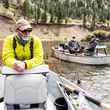
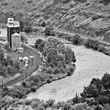
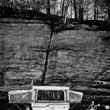
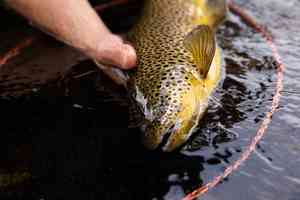


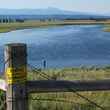
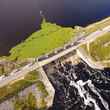
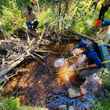





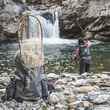



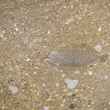
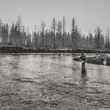
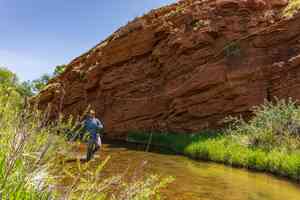


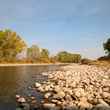

Comments